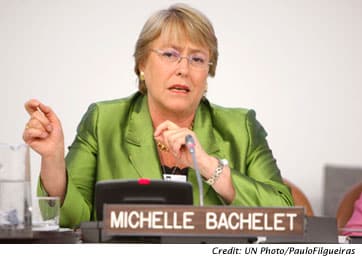
 UNITED NATIONS (WOMENSENEWS)– Today’s election of 41 U.N. member states to the executive board of the emerging "super agency" for women includes Iran and Saudi Arabia.
UNITED NATIONS (WOMENSENEWS)– Today’s election of 41 U.N. member states to the executive board of the emerging "super agency" for women includes Iran and Saudi Arabia.
That outrages Iranian Shirin Ebadi, a 2003 Nobel laureate and leading women’s rights and pro-democracy activist, who called it a "mocking situation" for U.N. Women in commencement of its work.
"How can a country that has not ratified CEDAW, the Convention on the Elimination of Discrimination Against Women . . . be a member of that board and speak about women’s rights?" she said through a Persian translator at a U.N. press conference Tuesday. "I think that this board–with the members that we can see–will not get anywhere."
Ebadi was at the United Nations to lobby for a General Assembly resolution condemning the country’s human rights record.
Marianne Mollman, advocacy director for the women’s rights division of Human Rights Watch, agrees.
"They should not allow their position on U.N. Women to whitewash their home policies and say ‘we are so good with women’s rights,’ because they are not," she said in an interview on Monday.
Given the two countries’ gender restrictions, Mollman called their possible inclusion a provocation to the world’s women.
Women in Saudi Arabia must receive permission from a male guardian to travel, work, study and marry. They make up less than 10 percent of the work force and are forbidden to drive.
Iran has no laws to protect women from domestic violence and imposes what is widely seen as cruel and unusual punishment for nonviolent crimes. Sakineh Mohammedi Ashtiani’s death sentence by stoning for an adultery conviction provides the current, high-profile example. In September Iran suspended her stoning sentence but is still expected to order her hanged.
Bani Dugal, a member of Gender Equality Architecture Reform, a civil-society coalition that advocated for the creation of U.N. Women, shares Mollman’s concern. "It really sends the wrong message for a country that has stoning on its books to potentially automatically get a place on this board."
At the same time, Dugal said board membership could encourage Saudi Arabia and Iran to repeal restrictive and discriminatory laws against women.
Today’s vote will be made by the U.N.’s 51-member Economic and Social Council.
Another Step Forward
The election is one of the most visible steps forward for U.N. Women since September, when Secretary General Ban Ki-moon appointed Michelle Bachelet, former president of Chile, to lead the agency.
Bachelet has since been in New York working to jumpstart U.N. Women, which officially starts work in January.
A U.N. official told Women’s eNews that country donations so far total around $200 million for the first year of the agency’s operations, far short of a $500 million annual budget that had been projected.
Gretchen Luschinger, a spokesperson for U.N. Women, could not confirm those figures with fundraising ongoing during the next two months.
Luschinger said U.N. Women is not involved in the nomination or election process of the executive board and she declined to comment on the potential membership of Iran and Saudi Arabia.
The 41-member board is charged with overseeing priorities and implementing overall policy. Countries do not have to appoint gender specialists to sit on the board. It is not expected to affect day-to-day programming.
Regional Representation Rules
Regional representation rules require the board have representatives from 10 African countries, 10 Asian countries, four Eastern European countries, six Latin American and Caribbean countries and five countries from Western Europe.
The Asian group–which encompasses the Middle East –initially submitted a "clean slate," or 10 countries for 10 openings, Iran among them.
It has since expanded its slate, leaving it up to the vote by the Economic and Social Council to decide whether a representative of Iran will be on the board.
Saudi Arabia and Mexico are running uncontested for the two slots reserved for so-called emerging donor nations.
The last four slots will be filled by "traditional" donors: the United States, the United Kingdom, Norway and Spain.
U.N. Women will combine four existing U.N. gender offices. In the next two months those offices will be moving from quarters scattered around the headquarters building to a central office on East 42nd Street, a block away from U.N. Secretariat. Job posts will be reassigned under U.N. Women and openings will be publicly advertised.
In her first meeting with leaders of civil-society groups in October, Bachelet identified peace and security, gender mainstreaming within the U.N. system and governments and economic empowerment as priorities, Dugal said. Bachelet also mentioned the need for "quick wins" that can be achieved within the first 100 days so the new agency makes an early mark.
Longer-term initiatives may include advancing reparations programs for victims of sexual violence and a new international research center on gender, peace and security in Africa, said Anne Marie Goetz, chief advisor of governance, peace and security for UNIFEM, one of the offices involved in the merger.
Would you like to Comment but not sure how? Visit our help page at https://womensenews.org/help-making-comments-womens-enews-stories.
Would you like to Send Along a Link of This Story?
https://womensenews.org/story/international-policyunited-nations/101109/iran-saudi-arabia-run-un-womens-board
Amy Lieberman is a correspondent at the United Nations Secretariat.
For more information:
UN Women:
http://www.unwomen.org


